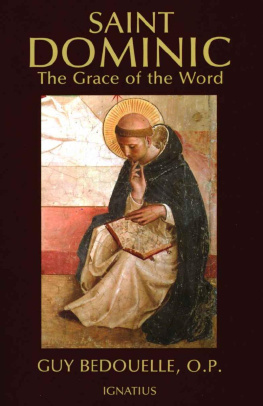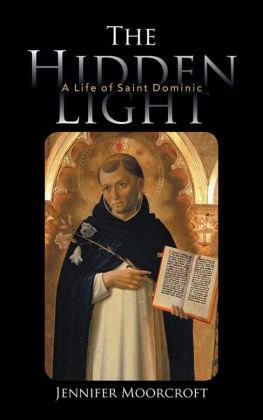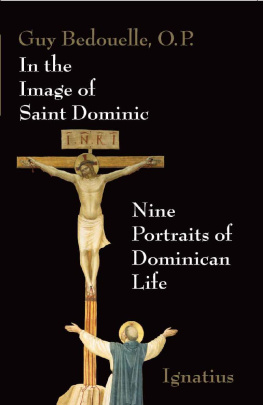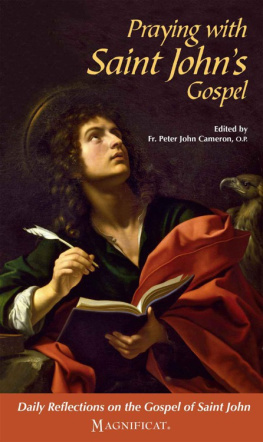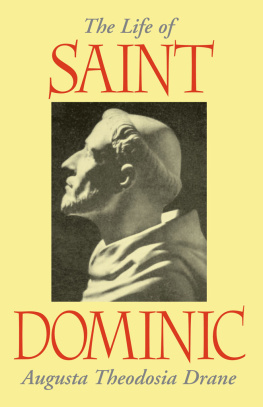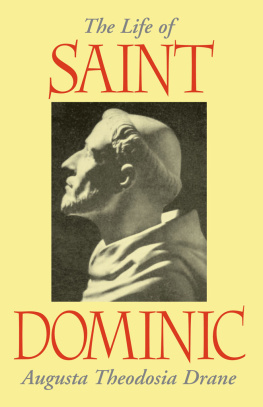SAINT DOMINIC
THE GRACE OF THE WORD
GUY BEDOUELLE, O.P.
SAINT
DOMINIC
THE GRACE OF THE WORD
Translated by
Sister Mary Thomas Noble, O.P.
IGNATIUS PRESS SAN FRANCISCO
Title of the French original:
Dominique, ou la grace de la parole
1982 Fayard-Mame
Cover art credit: SCALA / Art Resource, New York
Detail of St. Dominic from a work entitled
The Mocking of Christ
by Fra Angelico
Museum San Marco, Florence
Cover design by Roxanne Mei Lum
Maps by Gregory P. Hartnell
With ecclesiastical approval
1987 Ignatius Press, San Francisco
Revised edition
1995 Ignatius Press
All rights reserved
ISBN 0-89870-531-2 (PB)
ISBN 978-1-68149-414-2 (EB)
Library of Congress catalogue number 86-83018
Printed in the United States of America
To the Brethren and Sisters
of the Order of Preachers
and to all who have been touched by
the grace of Dominic
CONTENTS
PREFACE
In the late spring of 1983, thirty-five American Dominican sisters and friars embarked on a pilgrimage to the lands of Dominic: Spain, France and Italy. Sponsored by Parable for Dominican Life and Mission this was not only a journey to the places sacred to the memory of St. Dominic and the beginnings of the Order of Preachers, but a true pilgrimage combining prayer with serious study of the sources of our history already brought out in English and the intense experience of common life and its attendant asceticism well familiar to those who have travelled with such a group over a period of time. In addition to the more than thirty pilgrims there were other travelling companions, who through their research and writings became not only fellow travellers, but even leaders and tour guides: Pierre Mandonnet, O.P., Marie-Humbert Vicaire, O.P., William A. Hinnebusch, O.P., and Simon Tugwell, O.P.
It was during this journey that I first encountered Fr. Guy Bedouelles spiritual portrait of St. Dominic in its original French edition. With the present translation of his work, Fr. Bedouelle becomes a fellow pilgrim for English-speaking Dominicans and his portrait of St. Dominic will, for a long time to come, instruct and inspire all the members of the Dominican Family who in each generation strive to know the Vir Evangelicus as Father, Founder and friend.
The twentieth century has witnessed an intensification of interest in Dominican sources, and serious scholarship has produced critical editions, translations and commentaries. We have been provided with a clear notion of the geographical, cultural and religious influences which shaped the mind of Dominic de Guzman and his plan to begin an international order of preachers. Indeed, some contemporary writers portray the Founder within a context of ideas and relationships which converged in the early thirteenth century in such a way as to make the beginning of the Order an imperative which Dominic could have avoided only with difficulty! In the recent past we, the sons and daughters of such a Founder, have tended to tell his story in terms of originality and innovation; recent research has brought into sharp relief the need to add the realities of continuity and fidelity to the tradition.
In his biography of St. Dominic, Bedouelle has taken this into account and has begun the task of drawing out the spiritual implications of these relationships and historical factors with a delicacy and insistence yet unknown among those who write from the vantage point of both the historian and the theologian. The author has underscored Dominics continuity with the tradition of religious life while rejoicing in his innovative joining of that tradition with the all encompassing ministry of the word. In reading Bedouelles work one is struck again by the genius of St. Dominic, a genius not based on a brand new idea, for clearly it was his relationship with Diego, his travel through Albigensian territory and his life of contemplative preparation as a canon at Osma which in some way provided him with the germ of his later project. His real genius lay in his bold taking over of the ideas and plans suggested by others and by the needs of his time in such an audacious manner that he not only drew the best preachers and teachers his era could offer, but he captured the hearts and imaginations of scores of men and women who wished to become part of the preaching mission. Bedouelle himself describes the charism of Dominic as a synthesis, rather than an original invention.
In one sense Bedouelles present book is the launching of a new literary genre for Dominican literature in English. In a style at once scholarly and popular this work will appeal to the novice as well as to those who have known St. Dominic for many years. The combination of historical comprehensiveness and keen theological insight in this work brings Dominic alive as the contemplative and the tireless preacher fed from a deeply interior stream of life. One is reminded of the words of Fr, Vicaire in his commentary on the forces which motivated St. Dominic: Thus the deepest source of his inspiration was not his love of the Church or even his evangelism, but, as was the case for the apostles, his love of Christ Jesus. It is this Christological fire which is at the heart of Bedouelles book and makes his spiritual portrait of St. Dominic useful to all readers. It is a revelation of the authors own relationship to the subject of his work and a clear restatement of the ultimate purpose of St. Dominics own life and mission: preaching and the salvation of souls.
Fittingly, the present translation is the work of a Dominican nun, Sister Mary Thomas, O.P., of Our Lady of the Rosary Monastery in Buffalo, N.Y. We are grateful to her and her community for this work which is a valuable gift to the Church in our time.
Gabriel ODonnell, O.P.
Dominican House of Studies
Washington, D.C.
January 6, 1987
INTRODUCTION
This book is not a new life of St. Dominic. It was conceived, rather, as a spiritual portrait, an attempt to fathom the serenity of a countenance, to gaze upon the features of a servant of God. It would have been unthinkable, though, to pluck the figure of the founder of a new religious family from his setting, for it was that which opened the way, within the Church, for a distinct inspiration, a spiritual temperament, or to put it better, a definitive grace.
Almost every century has had its own life of St. Dominic. Each has drawn its own portrait, ranging from the reverent and moving Libellus , written by Jordan of Saxony to reveal the holiness of his predecessor as Master of the Preachers, up to the last century which gave us, for example, the flamboyant Life of St. Dominic limned by Lacordaire, as he himself said, with bold strokes. In our own time, besides the portraits by Henri Petitot, Bede Jarrett and, recently, Pie-Raymond Rgameyto draw from three generationswe also have the miniature by Bernanos and the huge reredos by Father Vicaire, which with a vast, broad sweep shows Dominic in his particular era and in his position within the Church.
Without a doubt these texts reflect their times clearly, as do the various pictorial representations of Dominic throughout the ages. How are we to choose between the tranquillity of the thirteenth-century iconsthe panel ascribed to Guido of Siena or the plaque in the Museum of Capodimonte at Naplesbetween the serenity of feature lent him by Fra Angelico, the severity of the anachronistic inquisition suggested by Berruguete, or the tragic mask of El Greco? History follows the same pattern: like its predecessors, our Dominic will reflect to some extent the values of the author, his world-view, the aspirations and limitations of his era.
It is true that modern methods of investigation allow for a plurality of approaches. We shall try to draw our Dominic with decisive strokes, with all the power of the truth of authentic documents, and without the elaborations of legend. We shall not underestimate the importance of a global perspective: Dominic had not only a social, local setting among neighbors and disciples; he was also a man of his times, times rich in change and evolution.
Next page
